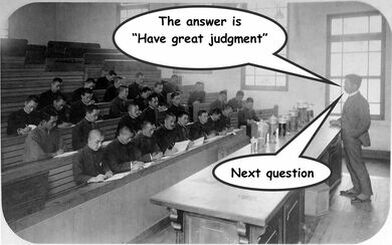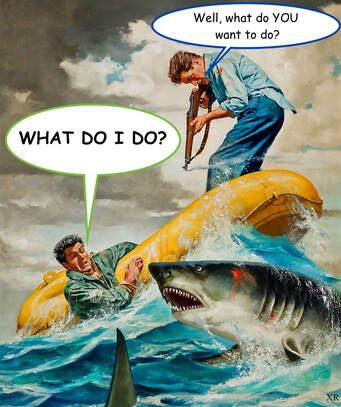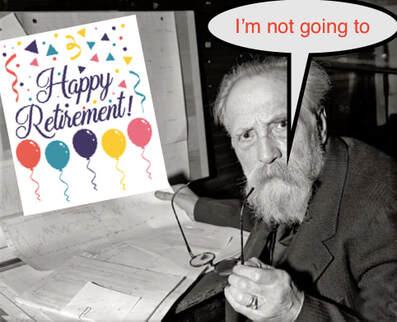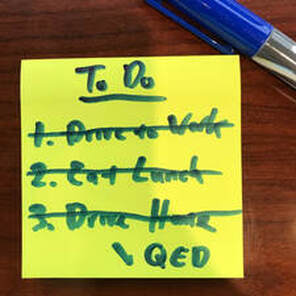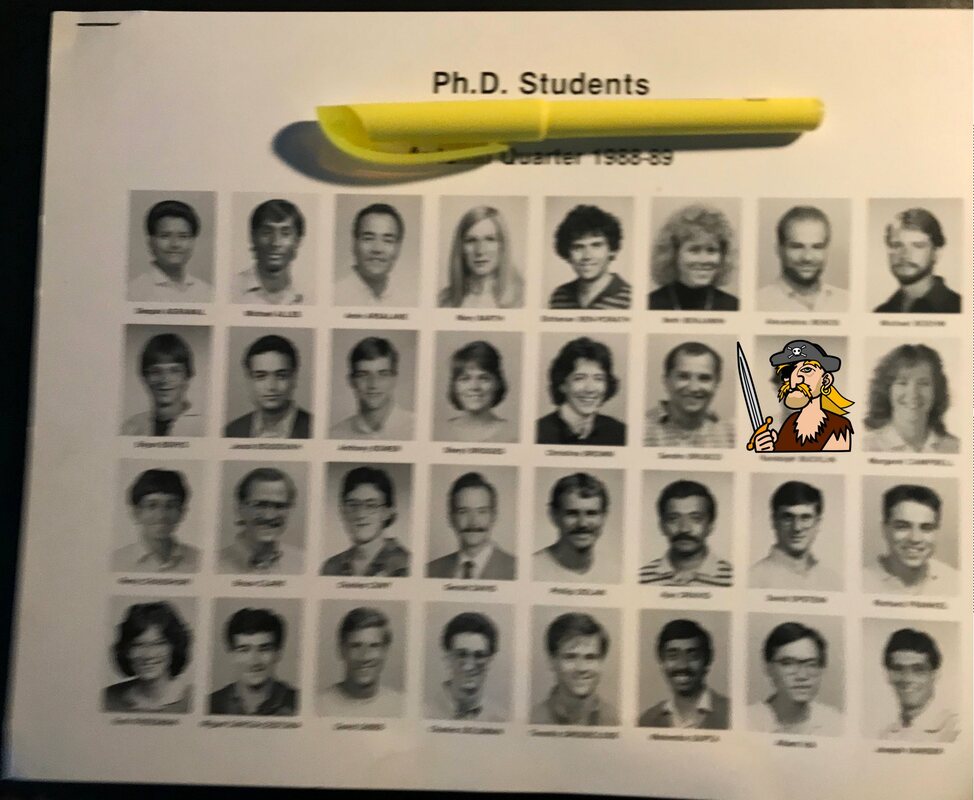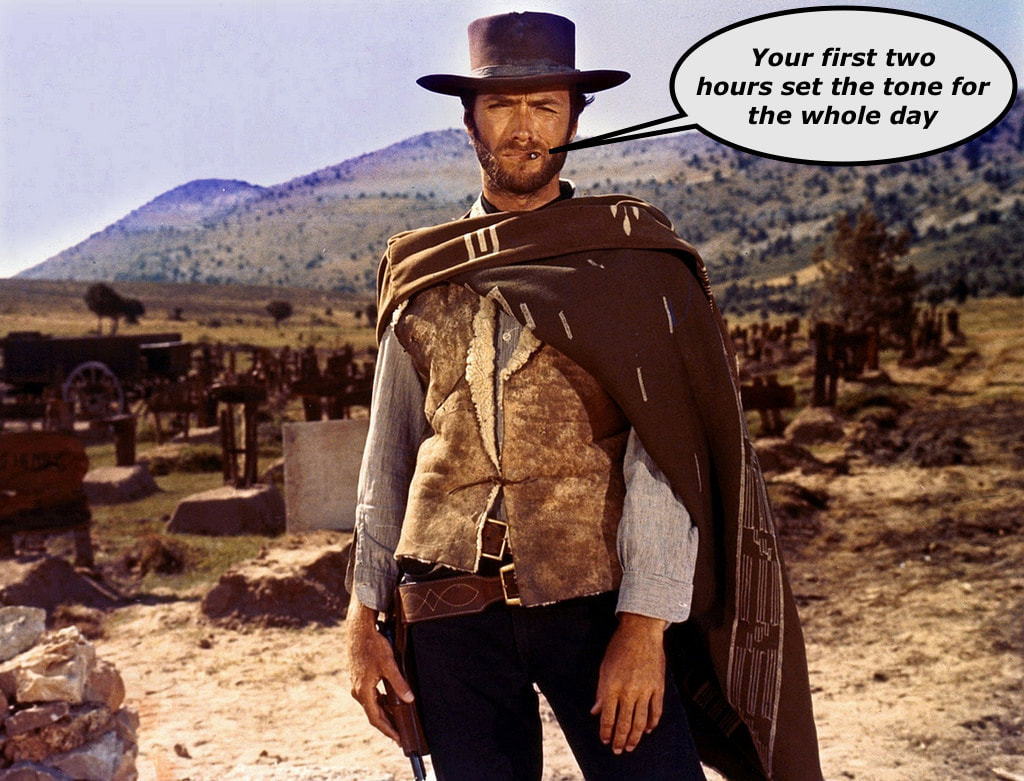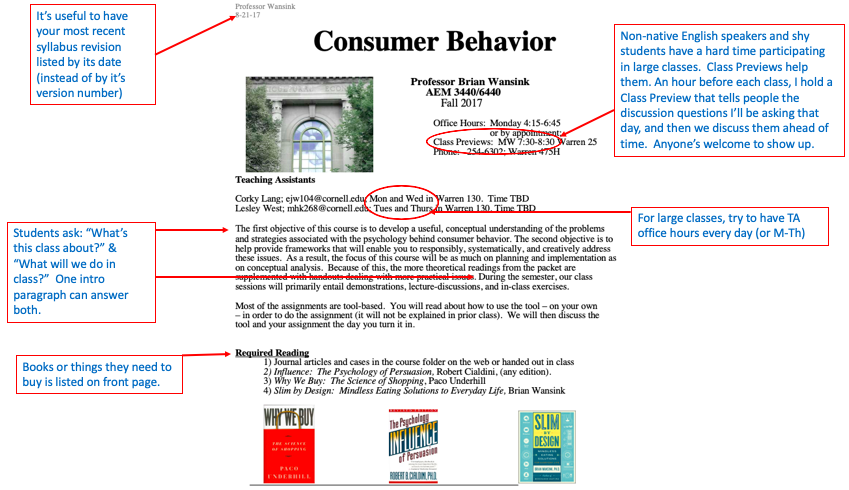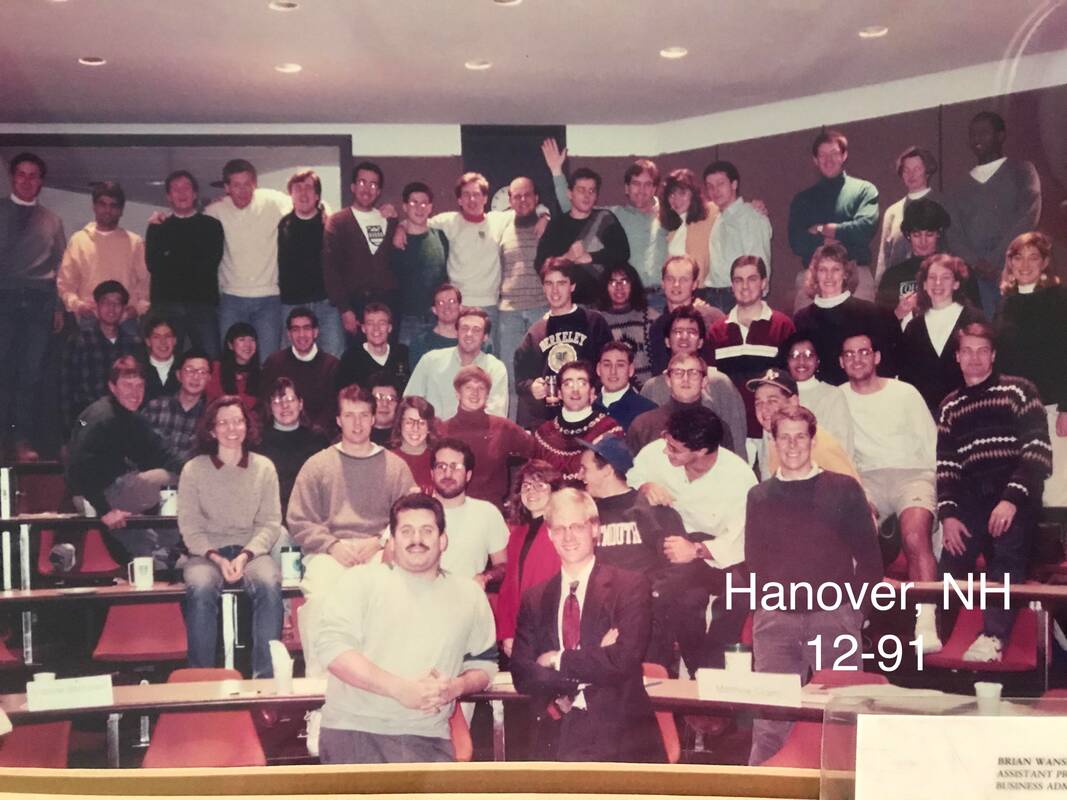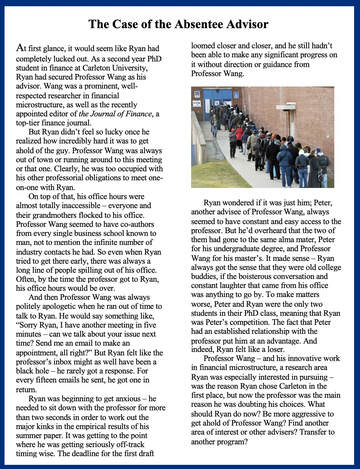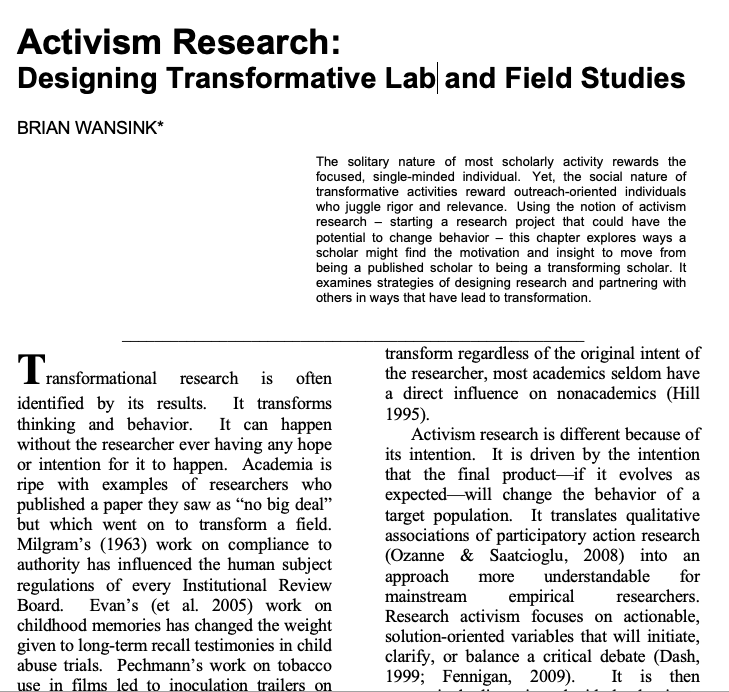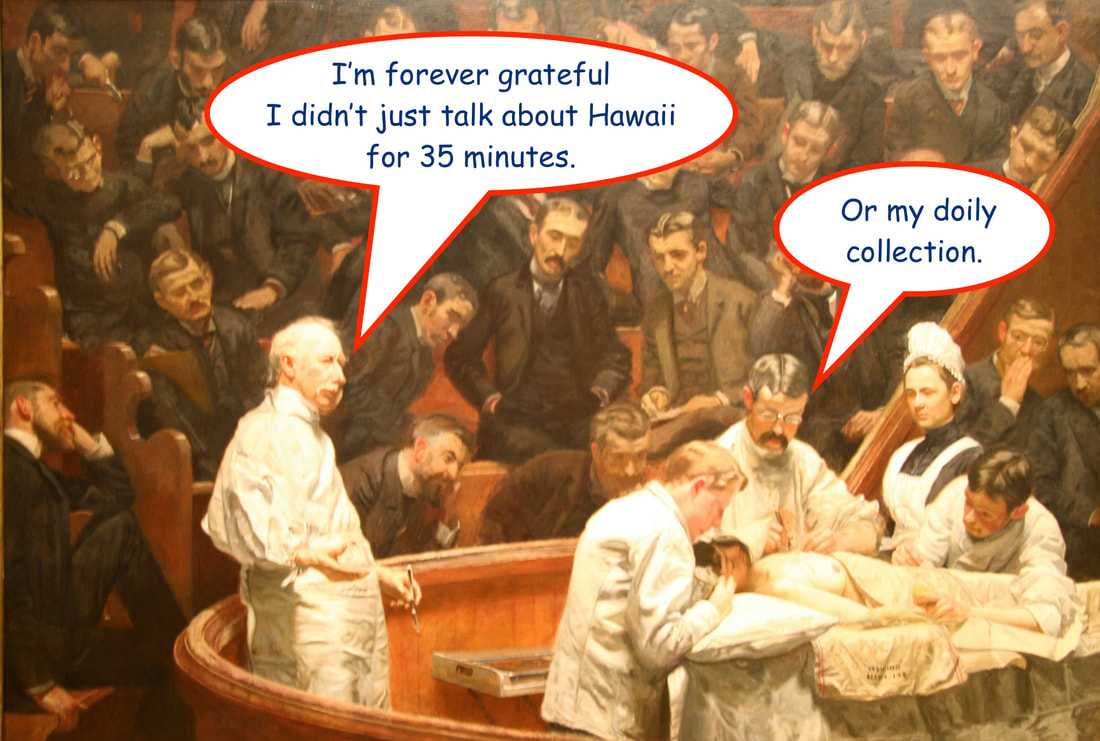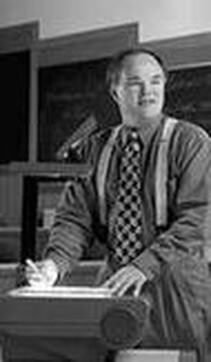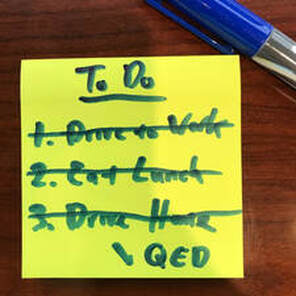 There are 100 things on your mental To-Do list. There are daily duties (like email and office time) and pre-scheduled stuff (like classes and committee meetings). But what still remains at the end of the day are the things that are easy to put off because they don’t have hard or immediate deadlines – things like writing an intro to a paper, submitting an IRB proposal, drafting a grant, completing some analysis tables, and so on. At the end of the year, having finished all of these might be what makes the difference between an exceptional year and another “OK” one. But these projects are also the easiest things to put off or to only push ahead 1 inch each week. If you push 100 projects ahead 1 inch each week, you’ve made 100 inches of progress at the end of the week, but your desk is still full and you’re feeling frustratingly resigned to always be behind. This is an incremental approach. A different approach would be to push a 50-inch project ahead until it is finished and falls off the desk; then you could push a 40-inch project ahead until it falls off; and then you can spend the last of your time and energy pushing a small 10-inch project off your desk. This is the “push-it-off-the-desk” approach. Both approaches take 100-inches of work. However, the “push-it-off-the-desk” approach changes how you think and feel. You still have 97 things left to do, but you can see you made tangible progress. For about 12 years, I tried a number of different systems to do this – to finish up what was most important for the week. Each of them eventually ended up being too complicated or too constraining for me to stick with. Eventually I stopped looking for a magic system. Instead, at the end of every week, I simply listed the projects or project pieces I was most grateful to have totally finished. Super simple. It kept me focused on finishing things, and it gave me a specific direction for next week (the next things to finish). It’s since evolved into something I call a “3-3-3 Weekly Recap.” Here’s how a 3-3-3 Weekly Recap works. Every Friday I write down the 3 biggest things I finished that week (“Done”), the 3 things I want to finish next week (“Doing”), and 3 things I’m waiting for (“Waiting for”). This ends up being a record of what I did that week, a plan for what to focus on next week, and a reminder of what I need to follow up on. It helps keep me accountable to myself, and it keeps me focused on finishing 3 big things instead of 100 little things. Here’s an example of one that’s been scribbled in a notebook at the end of last week: Even though you’d be writing this just for yourself, it might improve your game. It focuses you for the week, it gives you a plan for next week, and it prompts you to follow-up on things you kind of forgot you were waiting for.
Sometimes I do it in a notebook and sometimes I type it and send it to myself as an email. It doesn’t matter the form it’s in or if you ever look back at it (I don’t), it still works. I’ve shared this with people in academia, business, and government. Although it works for most people who try it, it works best for academics who manage their own time and for managers who are supervising others. They say it helps to keep the focus on moving forward instead of either simply drifting through the details of the day or being thrown off course by a new gust of wind. If you work with PhD students or Postdocs, it could help them develop a “Finish it up” mentality, instead of a “Polish this for 3 years until it's perfect” mentality. It’s also useful as a starting point for 1-on-1 weekly meetings. If they get in the habit of emailing their 3-3-3 Recap to you each Friday, you can share any feedback and perhaps help speed up whatever it is they are waiting for. Especially if it’s something on your desk. Ouch. Good luck in pushing 3 To-Dos off your desk and getting things done. I hope you find this helps. In 2017-19, about 18 of my research articles were retracted. These retractions offer some useful lessons to scholars, and they also offer some useful next steps to those who want to publish in the social sciences. Two of these steps include 1) Choose a publishable topic, and 2) have a rough mental roadmap of what the finished paper might look. That is, what’s the positioning, the study, and the possible contribution. The topics I’ve described here offer one set of roadmaps that could be useful. First, they were of interest to journals in medicine, behavioral economics, marketing, nutrition, psychology, health, and consumer behavior. Second, they each show what a finished paper might look like. They show the positioning, relevant background research, methodological tips, and key implications.
Table 1 and Appendix A lay out an estimate of how much effort it might take to do studies on these topics, and I’ve also estimated what I think the practical impact each research project might have. These are my own subjective estimates, but you might find them a useful starting point if you’re looking for a tie-breaker between two different topics. I would strongly encourage anyone who’s interested in publishing in these areas to closely follow principles of open science, from preregistration of hypotheses and analytic strategies to open materials and open data. Making specific hypotheses and testing them by following open science principles will be the best next way forward. A good introduction to these principles, along with hands-on advice, is this: Klein, O., Hardwicke, T. E., Aust, F., Breuer, J., Danielsson, H., Hofelich Mohr, A., … Frank, M. C. (2018). A practical guide for transparency in psychological science. Collabra: Psychology, 4(1), 20. DOI: http://doi.org/10.1525/collabra.158 Academia can be a tremendously rewarding career both you and for the people who benefit from you research. Best wishes in moving topics like these forward, and best wishes on a great career.  Some scholars are truly amazing and heroic. They’re self-made, and their career’s been flawlessly filled with perfect decisions and perfect timing. Then there’s the rest of us. The rest of us have succeeded because we were all raised, socialized, and helped by other people. Outside of academia, some of these people are obvious: parents, close relatives, coaches, and some teachers. But inside academia, not all of these people are as obvious. They might be that undergraduate professor who recommended we go to one grad school versus another, or the one who helped get us our first tenure-track job, helped lend a hand during a difficult time, or saved us from a desert island that one time by paddling through shark infested waters using only their right arm. With Thanksgiving coming up, it can be a nice chance to hit pause and think of 2-3 nonobvious people who might have done a small thing that made a big difference in your life. Doing something as simple as this can do your soul good. On one extreme, it reminds us that we aren’t the self-centered Master of our Universe as we might think when things are going great. On the other extreme, it reminds us that there are a lot of people silently cheering for us when we might think things aren’t going so great. What do you suppose would happen if you tracked these people down and game them a call? It’s four steps: 1. Find their phone number and dial. 2. “Hey, I’m ___; remember me? How are you?” 3. “It’s Thanksgiving. I was thinking of you” or "It's not Thanksgiving, but I've been thinking of you." 4. “Thanks” For about the past 30 years, I’ve tried to do this each Thanksgiving. It used to be the same 3-4 people (advisors and a post-college mentor), then a couple more, and this year I’m adding a new one. For some reason, I always look for an excuse why I shouldn’t make these calls. I always find myself pacing around before I make the first call. Part of me thinks I might be bore them, or they already know it, or it’s interrupting them, or that it’s too corny. Yet even if I have to leave voice messages, I’m always end up smiling when I get off the phone. I feel more thankful and centered. I feel happier. Maybe they feel differently too. Still, there’s some years I never made any calls, because I had good excuses. Maybe it was too late in the day, or they were probably with their family, or I called them last year, or I didn’t really have enough time to talk. I’m sure they had some good excuses – way back when – as to why they didn’t have time for me. I’m thankful they didn’t use them. If you can think of 2-3 people you’re thankful for who might not know it, you don’t have to wait until Thanksgiving next year to tell them. They won’t care that you’re a little bit late or a whole lot early. It’s only 4 steps. 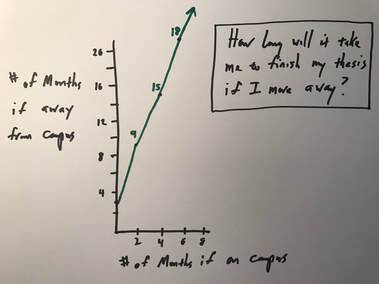 Here's a guess as to how long will it take to finish an off-campus dissertation. This is rough because I sketched it out during a break in a dissertation defense of a student who had left campus to take a job about two years earlier. Here's a guess as to how long will it take to finish an off-campus dissertation. This is rough because I sketched it out during a break in a dissertation defense of a student who had left campus to take a job about two years earlier. Some people love graduate school, but most of us want to finish it up and get started with our real lives. A couple nights ago I met a nice guy from Utah who was finishing his thesis at a university about 5 hours away. He had just moved here to take a job. After only two weeks, he was totally immersed in his new job, and I asked him if he was concerned about being able to finish up his thesis. He said, "Oh, no, not at all. My university's only 5 hours away, and I've only got a couple months of work left on it." The idea of starting a new life or a new job a few months early – say, before we’ve wrapped up our dissertation – sounds pretty good. After all, some people telecommute from home, so it should be a snap to telecommute back to the university and finish up our dissertation away from the anxieties of campus. For instance, you could now start your new gig (maybe as a professor) in June instead of August. Your plan would be to move, get settled, wrap up the dissertation, and get two months of a tempting new salary. When I was a PhD student, someone told me that if you want to know how long it will take to finish your dissertation if you move away, you use a simple formula. You take your best guess of how long you think it will take to finish, then you triple it and add three months. So if you think you have 2 months left on your dissertation, and you move away in June, you won’t be finished until following March – in 9 months instead of 2 months (2 months x 3 + 3 months = 9 months). This is a rough rule-of-thumb, that varies across schools, departments, and people. Still, when I heard this, I wasn’t going to take any chances. My lease was up, but I spent the last two months crashing at the apartments of different friends so I could wrap it up before I move away to start my Asst Prof gig. What happens when you move is not only that it takes time to get resettled and you no longer have the support structure of your PhD program (and the “in sight & in mind” attention of your committee), but you also don’t feel the urgency to finish. You’re settling into a new role, and everybody's happy to have you around. But in a few months when your department chair asks whether you’re through, it’s going to be awkward to answer. You might not have the option of completing a dissertation on campus, but if you can, it’s worth sleeping on couches until it’s done. ****************************************** Post Note: Four months after meeting the guy Utah, I ran in to him again at the same game cafe where we had originally met. He was excited having moved, and he was excited about his new job. What's notable was that he never mentioned anything about his dissertation, how it was going, or whether it was finished. Since his dissertation had been an enthusiastic 80% of our conversation during the first time we met, I'm guessing he hadn't made the progress he had expected to make. |
Welcome...Fun, useful, or wacky experiences about getting tenure, teaching better, publishing more, and having an incredibly rewarding career.
Categories
All
Some Blog ShortcutsArchives
September 2020
|
||||||||||||
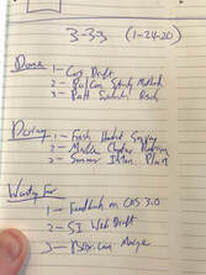
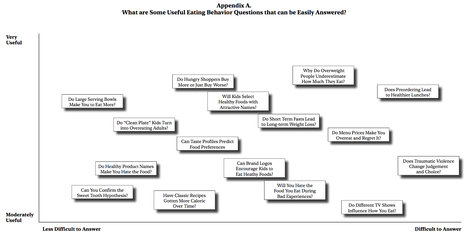
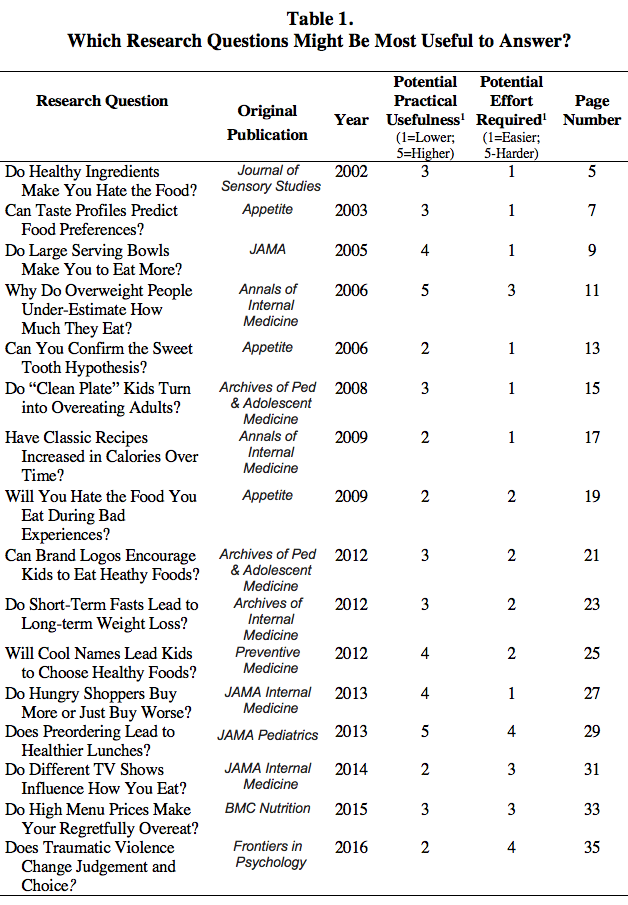


 RSS Feed
RSS Feed
